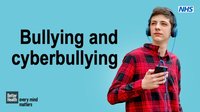Bullying and cyberbullying — KS3 and KS4 lesson plan
Developed with teachers and NHS-approved, this lesson helps students explore the meaning and impact of bullying and cyberbullying, what they can do and how they can find support and advice.
Includes a short video to prompt discussion.
Curriculum
Supports the Relationships Education and Health Education statutory guidance
Respectful relationships
- about different types of bullying (including cyberbullying), the impact of bullying, responsibilities of bystanders to report bullying and how and where to get help
Online and media
- about online risks, including how sharing material with others can increase the risk of it being shared online, and the difficulty of removing potentially compromising material placed online
- not to provide material to others that they would not want shared further and not to share personal material which is sent to them
- what to do and where to get support to report material or manage issues online
Supports the PSHE curriculum
KS3
Core theme 1: Health and wellbeing
- H30 — how to identify risk and manage personal safety in increasingly independent situations, including online
Core theme 2: Relationships
- R38 — to recognise bullying, and its impact, in all its forms; the skills and strategies to manage being targeted or witnessing others being bullied
- R37 — the characteristics of abusive behaviours, such as grooming, sexual harassment, sexual and emotional abuse, violence and exploitation; to recognise warning signs, including online; how to report abusive behaviours or access support for themselves or others
- R43 — the role peers can play in supporting each other to resist pressure and influence, challenge harmful social norms and access appropriate support
KS4
Core Theme 1: Health and Wellbeing
- H22 — ways to identify risk and manage personal safety in new social settings, workplaces, and environments, including online
Core theme 2: Relationships
- R15 — the legal and ethical responsibilities people have in relation to online aspects of relationships
- R16 — to recognise unwanted attention (such as harassment and stalking including online), ways to respond and how to seek help
- R31 — the skills and strategies to respond to exploitation, bullying, harassment and control in relationships
Learning outcomes
After this lesson, students will be able to:
- describe the meaning of bullying and cyberbullying, and the impact this can have on an individual
- explore challenging scenarios and their appropriate responses
- explain where to seek support and advice on bullying and cyberbullying
More information on how to use these lesson plans in the classroom is available on the PSHE Association website.
Resource details
- Topics: Schools
- Target audience: Students and teachers
- Published: 15 August 2024
- Last updated: 7 August 2024
